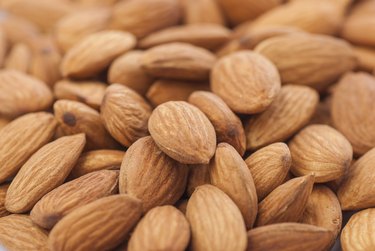
While eating almonds in moderation is unlikely to cause gas, eating too many of them could lead to gassiness if your diet is packed with a lot of gas-causing foods. The fiber in almonds can be gas-causing when consumed in excess. If you're having problems with chronic intestinal gas, however, it's likely not caused by almonds alone.
Fiber in Almonds
Video of the Day
Fiber can cause gas, especially when you eat a large amount of it. So when eating almonds as part of a fiber-rich diet you, may experience gas. A 1-ounce portion, or about 23 almonds, provides 3.5 grams of dietary fiber. The American Heart Association recommends getting about 25 grams of fiber every day, and a high-fiber diet contains 25 to 30 grams of fiber daily, notes the University of California, San Francisco.
Video of the Day
When They Cause Gas
If you're not used to eating almonds and you suddenly consume a large quantity of them -- and therefore increased your fiber intake suddenly -- you may experience gas, at least temporarily. New York University Langone Medical Center reports that while sudden increases in fiber can cause gas, gradual increases in dietary fiber -- along with drinking plenty of water -- can help avoid side effects of sudden fiber increases such as gas, bloating, cramping and diarrhea.
Higher-Fiber Foods
Gassiness often occurs from eating a lot of foods that are higher in fiber than almonds -- or taking dietary fiber supplements. Fiber-rich choices include fruits, vegetables, nuts, seeds, whole grains and legumes. For example, a cup of green peas provides about 9 grams of fiber, 1 cup of pinto beans contains over 15 grams and 2 tablespoons of ground psyllium powder provide 12 grams of dietary fiber.
Gas-Causing Foods
If you're experiencing intestinal gas and you're consuming low to moderate amounts of almonds, chances are other components of your diet may be causing the gas. According to the National Digestive Diseases Information Clearinghouse, gas-causing foods may include beans, apples, pears, peaches, whole grains -- such as bran and whole wheat -- soda, apple juice, pear juice, milk, cheese, yogurt, ice cream, packaged foods, cabbage, brussels sprouts, mushrooms, broccoli, cauliflower, asparagus, artichokes, onions and sugar-free candies made using artificial sweeteners -- such as xylitol, mannitol and sorbitol. Some of these foods -- almonds included -- may produce gas because of a food intolerance to that specific food.
- Johns Hopkins Medicine: Gas in the Digestive Tract
- U.S. Department of Agriculture National Nutrient Database: Nuts, Almonds
- American Heart Association: Whole Grains and Fiber
- New York University Langone Medical Center: High-Fiber Diet
- U.S. Department of Agriculture National Nutrient Database: Beans, Pinto, Mature Seeds, Cooked, Boiled, Without Salt
- University of California, San Francisco: Fiber Supplements
- U.S. Department of Health and Human Services: Lowering Your Cholesterol With TLC
- National Digestive Diseases Information Clearinghouse: Gas in the Digestive Tract
- U.S. Department of Agriculture National Nutrient Database: Peas, Green, Cooked, Boiled, Drained, Without Salt